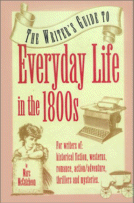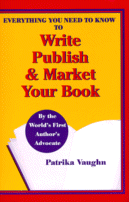Reviews of Writing Books
Page One of TwoEveryday Life in the 1800s by Marc McCutcheon
Writer's Digest Books, March 2001.Trade Paperback, 308 pages.
ISBN: 1582970637
Ordering information:
Amazon.com.
 Everyday Life in the 1800s is a historical
reference guide from the Writer's Digest
Everyday Life series. This reference covers
the 1800s, providing facts, timelines,
definitions and dates, as well as relevant information
about the time period, how people lived, famous
events and famous citizens. The slang
section is especially useful for writers in search of
dialogue appropriate to the period. This section
includes slang vocabulary
from the time period with word meanings
and sample sentences showing usage.
Other sections in the book cover transportation,
home and living, clothing and fashion, money,
occupations, health and medicine, food and
drink, amusements, slavery, courtship and
marriage and the Civil War.
Handy timelines covering important events,
published books and novels, innovations and
popular songs are also provided.
This is a very useful reference for historical, western and
romance writers that can help reduce trips to
the library and exhausting online search sessions.
Everyday Life in the 1800s is a historical
reference guide from the Writer's Digest
Everyday Life series. This reference covers
the 1800s, providing facts, timelines,
definitions and dates, as well as relevant information
about the time period, how people lived, famous
events and famous citizens. The slang
section is especially useful for writers in search of
dialogue appropriate to the period. This section
includes slang vocabulary
from the time period with word meanings
and sample sentences showing usage.
Other sections in the book cover transportation,
home and living, clothing and fashion, money,
occupations, health and medicine, food and
drink, amusements, slavery, courtship and
marriage and the Civil War.
Handy timelines covering important events,
published books and novels, innovations and
popular songs are also provided.
This is a very useful reference for historical, western and
romance writers that can help reduce trips to
the library and exhausting online search sessions.
Everything You Need to Know to Write Publish & Market Your Book by Patrika Vaughn
A Cappella Publishing, 1997.Paperback, 189 pages.
ISBN: 0312252765
Ordering information:
Amazon.com.
 This informative guide provides the
basics of publishing a book, as well as
inspiration and tips to get your
creative juices flowing. Author
Patrika Vaughn has served as
a literary agent, professional writer,
ghostwriter and writing teacher.
Some of the topics she covers include
curing writing fears, developing characters,
plot, beginning and endings, editing,
submitting and self-publishing.
The book includes some pithy advice
for writers as well. For example, in
the chapter about writing effective
beginnings, Ms. Vaughn
suggests that authors can wait
until later to write their opening scene.
"Feel free to write later scenes -- even
your climax -- first. Then, once you've
gotten inside your story and create the
tone of the piece, go back and write your
opening." In the same chapter Ms. Vaughn
comments on several openings
from popular novels, and provides a writing
exercise on creating a great opening. Ms. Vaughn's book
is just the thing for beginning writers who are feeling a
bit discouraged and could use a jump start in their careers.
This informative guide provides the
basics of publishing a book, as well as
inspiration and tips to get your
creative juices flowing. Author
Patrika Vaughn has served as
a literary agent, professional writer,
ghostwriter and writing teacher.
Some of the topics she covers include
curing writing fears, developing characters,
plot, beginning and endings, editing,
submitting and self-publishing.
The book includes some pithy advice
for writers as well. For example, in
the chapter about writing effective
beginnings, Ms. Vaughn
suggests that authors can wait
until later to write their opening scene.
"Feel free to write later scenes -- even
your climax -- first. Then, once you've
gotten inside your story and create the
tone of the piece, go back and write your
opening." In the same chapter Ms. Vaughn
comments on several openings
from popular novels, and provides a writing
exercise on creating a great opening. Ms. Vaughn's book
is just the thing for beginning writers who are feeling a
bit discouraged and could use a jump start in their careers.
Writing Reviews
Page One | Page Two
Return to the May 2001 issue of The IWJ.
More from Writers Write
